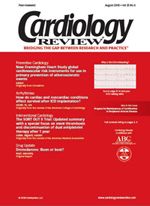In-stent thrombosis after temporary discontinuation of aspirin therapy
A 60-year-old man was admitted to the hospital after experiencing an inferior ST-segment elevation myocardial infarction.
A 60-year-old man was admitted to the hospital after experiencing an inferior ST-segment elevation myocardial infarction. An elective percutaneous coronary intervention (PCI) had been performed 17 months earlier because of stable angina. At that time, the patient was entered into the SORT OUT II (Danish Organization on Randomized Trials with Clinical Outcome) trial and was randomly assigned to receive high-pressure implantation of 2 overlapping drug-eluting Taxus® stents (3.0 x 32 mm and 3.0 x 16 mm) in the second segment of the right coronary artery. After the procedure, the patient was asymptomatic and received optimal medical therapy with a beta blocker, an angiotensin-converting enzyme inhibitor, a statin, 75 mg/day of clopidogrel (Plavix), and 75 mg/day of aspirin.
Treatment with clopidogrel was discontinued after 1 year (ie, 5 months prior to the current admission). A few days before the admission, the patient briefly discontinued aspirin on the advice of his orthopedic surgeon, before undergoing a minor arthroscopic procedure. At the current admission, the patient was in moderate distress and was hemodynamically stable. He promptly received 300 mg of aspirin, 600 mg of clopidogrel, and 10,000 IU of unfractionated heparin. Emergency coronary angiography showed in-stent thrombosis, and primary PCI was performed, with high-pressure implantation of 2 Cypher® stents (both 3.0 x 33 mm) overlapping the previously treated coronary segment.
The result was excellent, and a postprocedure thrombolysis in myocardial infarction (TIMI) grade 3 flow was achieved (
).
Figure
The procedure was supported by intravenous abciximab (ReoPro), and the patient’s hospital course was uneventful. Echocardiography showed inferolateral hypokinesia, with a moderately decreased left ventricular ejection fraction of 40%. The patient was discharged after 4 days and has been doing well on medical treatment, including dual antiplatelet therapy with 75 mg/day of clopidogrel and 75 mg/day of aspirin, which has been scheduled to continue indefinitely or until new therapies or evidence to the contrary become available.
